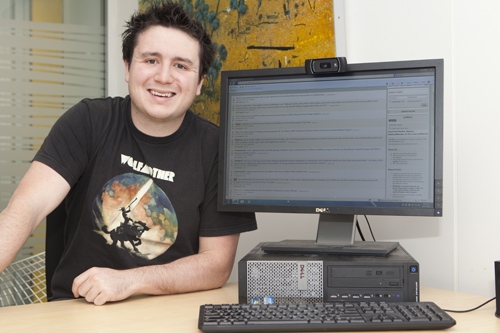Sarina Talip
5 February 2014: Compared to the student political activism of the 1960s, today's generation seems, well, positively slack.
Instead of staging demonstrations and sit-ins, marching on town hall, and getting into rowdy fights with police, when we do get political, we're likely to share a YouTube video, like a Facebook status, re-tweet a comment from a Twitter feed, or sign an online petition – all from the warm comfort of our lounge room.
 |
University of Canberra Phd student Max Halupka thinks people haven't stopped engaging in politics. Photo: Michelle McAulay |
But rather than disregarding these small, impromptu acts as meaningless or frivolous, PhD candidate Max Halupka thinks we need to rethink the so-called "clicktivism" – or "slacktivism", as it is also called.
The 25-year-old, who is in his second year of doing a PhD in governance at the Australia and New Zealand School of Government's (ANZSOG) Institute for Governance at the University of Canberra, thinks people have not stopped engaging in politics – rather, they have simply changed the way they engage.
"The political participation literature has a very narrow conception of what constitutes politics and the political," Mr Halupka said.
"There has been a strong tendency to focus on traditional approaches to political participation such as government, voting, political parties, unions, protests, social movements – social groups which have strong communal ties and are long-lasting.
"What has been observed is that there's been this declining interest in these traditional avenues of political participation."
At the same time, fewer people are joining in. Mr Halupka explained that in the influential 1995 journal article Bowling Alone, political scientist Robert Putnam lamented the declining number of people participating in religious and community groups such as church groups, literary societies, parent teacher associations, labor unions, and sports clubs – including, of course, bowling clubs.
"Academics see this as a real issue, an erosion of society. There's this belief that because people aren't engaging in these traditional ways, they're not engaging in politics or society anymore," Mr Halupka said.
"And of course what's been happening is that some academics and political parties have looked at clicktivism as a tool to feed existing political structures, for example, to sign up members for political parties, or to generate opinion polls.
But, he said, this kind of view is far too narrow. "What is perhaps needed is to look at clicktivism as a new approach to the political and a new way of people engaging. The question should be: how do we make these forms of engagement more meaningful?"
At the University's Research Festival's Big Ideas Pitch for Funds competition in October, Mr Halupka won the people's choice award when he took to the stage and spoke passionately, shaking his fist and banging the lectern at times, about how his research has the potential to reinvigorate the democratic system, to make politics enjoyable.
"The desire for political participation is there, and the people have found a way to express this. And we must capitalise upon it," he said in his speech.
"Not by using clicktivism as a tool to feed existing avenues, but as a springboard into uncharted territory.
"This new way of engaging should not be leashed to traditional methods of engagement, tamed, and stuffed back in its box. Rather, politics must change its approach, and adapt to the people."
Indeed, in today's world, with a seemingly endless number of political causes at our internet-connected fingertips, Mr Halupka believes we have adapted by becoming choosier about the causes we champion, from buying fair-trade, organic tea, to eating locally sourced food with few food miles, to wearing locally made clothes that haven't been made in sweatshops by children.
"Politics is an extension of the every day, and those small actions like buying fair-trade tea are meaningful, those are the ones that actually have weight," Mr Halupka said.
"And likewise, those small clicktivist acts are important. Clicking 'like' on someone's Facebook status that reads: 'I don't like the government', is akin to buying fair-trade tea.
"They are both an expression of support for, and engagement with, a particular project that people believe in. People are evaluating projects on an independent basis and looking at how they relate to their own lives.
"A lot of the time people don't want to make a big dent in their everyday life, so if drinking fair-trade tea involved travelling to Yass three times a week, well, then they probably wouldn't do it."
And for those who are over "traditional" politics and looking to become more active with that mouse button – you never know, "clicktivist" could soon be accepted as a job title – Mr Halupka has some advice.
"You are making a difference in your own small capacity. It doesn't have to take a big part out of your life, you can do it ad hoc, where you want, when you want, and a lot of the time it's not ideologically based – you're doing it because you feel it's the right thing to do."


